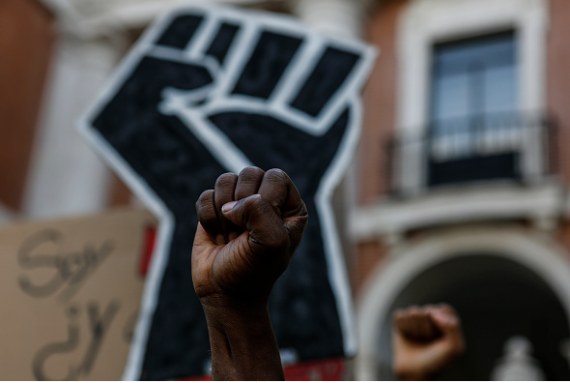Picture: GUILLERMO SANTOS/NUR PHOTO/GETTY IMAGES
The evolution of brands during social revolution was discussed during a recent Future of Media digitised event, which was held in collaboration with Vodacom, EziAds, Everlytic, Proudly SA, The MediaShop and WAN-Ifra and hosted by Yellowwood MD Refilwe Maluleke.
Maluleke started the conversation by stating: “It’s never felt like a more important time to be looking at the evolution of brands and the values they reflect about modern society and the volatile, uncertain times we find ourselves in. Around the world businesses have to evolve and adapt at lightning speed. Tensions exist between the world we want to have and the world we currently live in.”
One of the first touchpoints of the discussion was social media and social movements.
Michael Perman, former senior director of marketing at Levi Strauss & Company, innovation futurist and CEO of C’est What? explained the difference. He elaborated by saying: “People are seeking meaning right now. It’s hard to understand what truth means. Sense-making is an important path, leading to a narrative. The movements that we have seen have core parts of the narrative. They have a creation story, they have a creed, and there are rituals that take place. There is a difference between a fad and a trend. A movement has an ongoing story that is told. It provides the content to respond to the context.”
Patrick Hanlon, founder and CEO at primalbranding.co, who is considered the “Charles Darwin” of branding, added: “Primal code is the root code for building seriously authentic brands. It is nontraditional and uncovers the building blocks that attract people and bring them together. It’s used to deconstruct brands and bring them back together.”
He said primal branding has always been important. “It’s the reason we believe in people, places and things, for example #BlackLivesMatter and Covid. Some believe and some don’t. In the case of Covid, among other things, people need to have the message confirmed at least a few times before they believe it and for it to make sense to them. A message needs to be clear, and resonate. Remember, when marketing a product, the confused do not buy.”
Maluleke added that in the context of confusion, very little decision-making happens in the face of fear. He asked Joseph Perello what he thinks the role of brands is in the current environment.
Perello, founder and CEO of content company PROPS, spoke about a drive towards authenticity that marketers seek to embrace while still implementing their own strategy and tactics through the lenses of advertising. “All the creative systems are still trained to make ads, and those are not really authentic – they are created to be manipulating. If you really try deconstructing an advert, it’s a disrespectful communication to a person, because it cares only about itself and not about the person who’s looking at it.” Perello said that today the very reason for advertising is being questioned. It can’t be so one-sided any more; this is a time of creative destruction. “Exceptional brands are embracing cultural motions and others are just riding the wave on political matters. Then there are brands that are embracing content – not branded content, I mean the way brands are telling real stories. They are being authentic because they are not selling something; they are appealing to the masses for a greater cause,” he said.
Maluleke summed his comment up by saying: “It’s not about ‘do goodery’. To be authentic, brands themselves need to be unapologetic.” She then asked: “What is the role of ‘people’ brands here?”
Daouda Leonard, founder and CEO of CreateSafe and music producer for Lady Gaga, Grimes and others, answered: “Most artists are using their natural talents to provide some sort of healing to the community.” But he has also seen some artists who are confused about what they should be doing. “Making art is an expressive way to live your life. Some artists are using social channels really well, whereas others are still figuring out how to reach audiences though TikTok, for example. It’s a challenging time for a lot of artists, but I have seen artists provide empowering messages to those in the frontline of crises when communicated correctly.”
Leonard agreed that artists are very good at remaining culturally relevant. When asked how one navigates all the latest cultural shifts, he answered: “It comes from a place of mindfulness right now. In order to swap out the things you need to swap out, you need to have practice to do this.” He used rapper Kendrick Lamar as an example, saying that he has a team around him to synthesize and create beautiful stories that relate to audiences. It’s a moment where people catch up to what you’re doing, where iconic moments are created and real stories are told. “In today’s age, it’s easier to say: ‘I love these things I’ve built’, or on the other hand to own up to the mistakes made or even pivoting to a more authentic way of doing something from what was previously stated or portrayed.”
Hanlon agreed that, just like an artist, a purpose-driven brand has a purpose, meaning and a destiny it is moving towards; it is not just producing a product. It is working towards a larger mission.
From purpose to premium: Perman gave insights of what’s happening to premium brands during the latest pandemic. “All around the world there are cultural and economic divides. There is definitely an economic impact that will affect the premium brands, but there is now a redefinition of what premium means; it doesn’t necessarily mean luxury. Premium is about substance, providing value, showing authenticity and whether that brand is doing something good for the world. Once redefined, a customer and brand will value that sense of premium.”
Perman added that two of the major trends he’s seen are novel forms of empathy and sense-making. “On the sense-making point, brands could be deploying AI and blockchain to understand accuracy and truth. On the novel forms of empathy, we have a global deficit of oxytocin – lack of touch and communication. Now we need new forms of human connection. Media companies and brands have a role to play in this regard because they have to tell the right stories, exhibit the right rituals and say the right words to transcend the limitations of current virtual situations.”
In closing, Maluleke asked what the opportunities for brands are in today’s contex, especially in a time of social change.
Hanlon put it simply: “People are looking for change; if you are thinking of changing, now is the time to do so.”
Perello added: “We have access to all the people; what we need are great creators, good content and the courage to publish it and drive people there. That’s when brands will succeed.”
Perman concluded by saying: “Embrace a new form of singularity, which is the intersection between understanding trends and creating the future. Instead of waiting for an answer and asking about the trends, it’s about doing the work to create what’s next. Those are the brands that will win in the future.”
The next digitised event, “A momentary glimpse into what’s ‘real’ and the state of media”, will be taking place on August 4 at 10h00. For more information, or to register, click here.
The big take-out: It’s not about “do goodery”; brands need to be unapologetically authentic.
Article Source: https://www.businesslive.co.za/redzone/news-insights/2020-07-24-international-perspective-brand-evolution-during-social-revolution/





